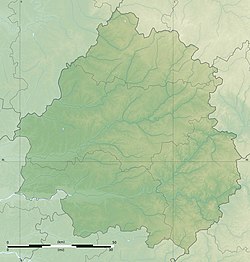
Lascaux
Caves in France with Paleolithic cave paintings / From Wikipedia, the free encyclopedia
Dear Wikiwand AI, let's keep it short by simply answering these key questions:
Can you list the top facts and stats about Lascaux?
Summarize this article for a 10 year old
Lascaux (English: /læˈskoʊ/ la-SKOH,[1] US also /lɑːˈskoʊ/ lah-SKOH;[2] French: Grotte de Lascaux [ɡʁɔt də lasko],[3] "Lascaux Cave") is a network of caves near the village of Montignac, in the department of Dordogne in southwestern France. Over 600 parietal wall paintings cover the interior walls and ceilings of the cave. The paintings represent primarily large animals, typical local contemporary fauna that correspond with the fossil record of the Upper Paleolithic in the area. They are the combined effort of many generations. With continued debate, the age of the paintings is now usually estimated at around 17,000 years (early Magdalenian).[4][5][6] Because of the outstanding prehistoric art in the cave, Lascaux was inducted into the UNESCO World Heritage List in 1979, as an element of the Prehistoric Sites and Decorated Caves of the Vézère Valley.[7]
| UNESCO World Heritage Site | |
|---|---|
 Depiction of aurochs, horses and deer | |
| Location | Montignac, France |
| Part of | Prehistoric Sites and Decorated Caves of the Vézère Valley |
| Criteria | Cultural: i, iii |
| Reference | 85-011 |
| Inscription | 1979 (3rd Session) |
| Area | 34.34 ha (84+7⁄8 acres) |
| Coordinates | 45°03′13″N 1°10′12″E |
The original caves have been closed to the public since 1963, as their condition was deteriorating, but there are now a number of replicas.


